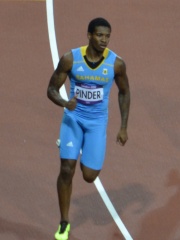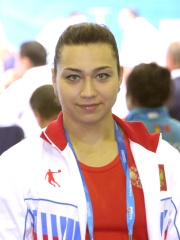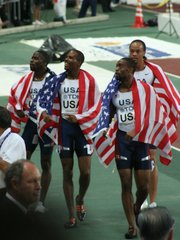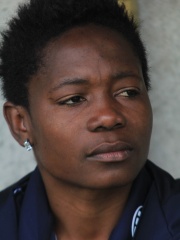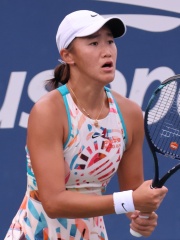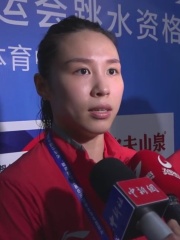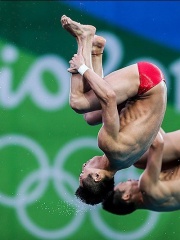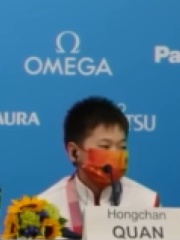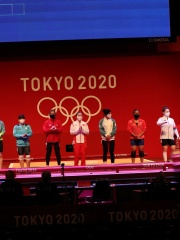Athlete
Li Ling
1989 - today

 Li Ling
Li Ling
Her biography is available in 14 different languages on Wikipedia. Li Ling is the 6,837th most popular athlete, the 1,701st most popular biography from China and the 179th most popular Chinese Athlete.
Li Ling is most famous for being a Chinese pole vaulter who has achieved significant success in her sport, including competing at the international level. She is known for her athletic prowess and contributions to pole vaulting in China.
Memorability Metrics
Page views of Li Ling by language
Among Athletes
Among athletes, Li Ling ranks 6,837 out of 6,025. Before her are Suzanne Balogh, Demetrius Pinder, Chen Wei-ling, Magdalena Fularczyk, Nadezhda Evstyukhina, and Xi Aihua. After her are Wu Jingbiao, Barbara Pierre, Dai Greene, Gwladys Épangue, Leroy Dixon, and Mike Tobey.
Most Popular Athletes in Wikipedia
Go to all RankingsSuzanne Balogh
1973 - Present
HPI: 35.54
Rank: 6,831
Demetrius Pinder
1989 - Present
HPI: 35.54
Rank: 6,832
Chen Wei-ling
1982 - Present
HPI: 35.54
Rank: 6,833
Magdalena Fularczyk
1986 - Present
HPI: 35.54
Rank: 6,834
Nadezhda Evstyukhina
1988 - Present
HPI: 35.53
Rank: 6,835
Xi Aihua
1982 - Present
HPI: 35.53
Rank: 6,836
Li Ling
1989 - Present
HPI: 35.53
Rank: 6,837
Wu Jingbiao
1989 - Present
HPI: 35.53
Rank: 6,838
Barbara Pierre
1986 - Present
HPI: 35.53
Rank: 6,839
Dai Greene
1986 - Present
HPI: 35.52
Rank: 6,840
Gwladys Épangue
1983 - Present
HPI: 35.52
Rank: 6,841
Leroy Dixon
1983 - Present
HPI: 35.51
Rank: 6,842
Mike Tobey
1994 - Present
HPI: 35.51
Rank: 6,843
Contemporaries
Among people born in 1989, Li Ling ranks 1,369. Before her are Sam Vokes, Chris Eubank Jr, Ola Kamara, Ingvar Jónsson, Kian Hansen, and Demetrius Pinder. After her are Wu Jingbiao, Peter Kennaugh, Álvaro Enrique Peña, Ramon Lopes, Genoveva Añonman, and Ali Cobrin.
Others Born in 1989
Go to all RankingsSam Vokes
SOCCER PLAYER
1989 - Present
HPI: 35.58
Rank: 1,363
Chris Eubank Jr
BOXER
1989 - Present
HPI: 35.58
Rank: 1,364
Ola Kamara
SOCCER PLAYER
1989 - Present
HPI: 35.57
Rank: 1,365
Ingvar Jónsson
SOCCER PLAYER
1989 - Present
HPI: 35.55
Rank: 1,366
Kian Hansen
SOCCER PLAYER
1989 - Present
HPI: 35.54
Rank: 1,367
Demetrius Pinder
ATHLETE
1989 - Present
HPI: 35.54
Rank: 1,368
Li Ling
ATHLETE
1989 - Present
HPI: 35.53
Rank: 1,369
Wu Jingbiao
ATHLETE
1989 - Present
HPI: 35.53
Rank: 1,370
Peter Kennaugh
CYCLIST
1989 - Present
HPI: 35.52
Rank: 1,371
Álvaro Enrique Peña
SOCCER PLAYER
1989 - Present
HPI: 35.52
Rank: 1,372
Ramon Lopes
SOCCER PLAYER
1989 - Present
HPI: 35.52
Rank: 1,373
Genoveva Añonman
SOCCER PLAYER
1989 - Present
HPI: 35.50
Rank: 1,374
Ali Cobrin
ACTOR
1989 - Present
HPI: 35.50
Rank: 1,375
In China
Among people born in China, Li Ling ranks 1,701 out of NaN. Before her are Shi Zhiyong (1980), Zhang Fengliu (1989), Yang Zhaoxuan (1995), Deng Zhiwei (1988), Hou Zhihui (1997), and Xi Aihua (1982). After her are Wu Jingbiao (1989), Bao Yingying (1983), Lei Tingjie (1997), Wang Xiyu (2001), Cai Zelin (1991), and Yu Dan (1987).
Others born in China
Go to all RankingsShi Zhiyong
ATHLETE
1980 - Present
HPI: 35.73
Rank: 1,695
Zhang Fengliu
WRESTLER
1989 - Present
HPI: 35.62
Rank: 1,696
Yang Zhaoxuan
TENNIS PLAYER
1995 - Present
HPI: 35.62
Rank: 1,697
Deng Zhiwei
WRESTLER
1988 - Present
HPI: 35.62
Rank: 1,698
Hou Zhihui
POLITICIAN
1997 - Present
HPI: 35.62
Rank: 1,699
Xi Aihua
ATHLETE
1982 - Present
HPI: 35.53
Rank: 1,700
Li Ling
ATHLETE
1989 - Present
HPI: 35.53
Rank: 1,701
Wu Jingbiao
ATHLETE
1989 - Present
HPI: 35.53
Rank: 1,702
Bao Yingying
POLITICIAN
1983 - Present
HPI: 35.52
Rank: 1,703
Lei Tingjie
CHESS PLAYER
1997 - Present
HPI: 35.46
Rank: 1,704
Wang Xiyu
TENNIS PLAYER
2001 - Present
HPI: 35.46
Rank: 1,705
Cai Zelin
ATHLETE
1991 - Present
HPI: 35.45
Rank: 1,706
Yu Dan
POLITICIAN
1987 - Present
HPI: 35.45
Rank: 1,707
Among Athletes In China
Among athletes born in China, Li Ling ranks 179. Before her are Wang Han (1991), Fang Yuting (1989), Mykhaylo Kokhan (2001), Chen Aisen (1995), Shi Zhiyong (1980), and Xi Aihua (1982). After her are Wu Jingbiao (1989), Cai Zelin (1991), Quan Hongchan (2007), Wang Zhouyu (1994), Wei Meng (1989), and Liao Qiuyun (1995).
Wang Han
1991 - Present
HPI: 36.10
Rank: 173
Fang Yuting
1989 - Present
HPI: 36.04
Rank: 174
Mykhaylo Kokhan
2001 - Present
HPI: 35.95
Rank: 175
Chen Aisen
1995 - Present
HPI: 35.75
Rank: 176
Shi Zhiyong
1980 - Present
HPI: 35.73
Rank: 177
Xi Aihua
1982 - Present
HPI: 35.53
Rank: 178
Li Ling
1989 - Present
HPI: 35.53
Rank: 179
Wu Jingbiao
1989 - Present
HPI: 35.53
Rank: 180
Cai Zelin
1991 - Present
HPI: 35.45
Rank: 181
Quan Hongchan
2007 - Present
HPI: 35.39
Rank: 182
Wang Zhouyu
1994 - Present
HPI: 35.33
Rank: 183
Wei Meng
1989 - Present
HPI: 35.33
Rank: 184
Liao Qiuyun
1995 - Present
HPI: 35.30
Rank: 185

